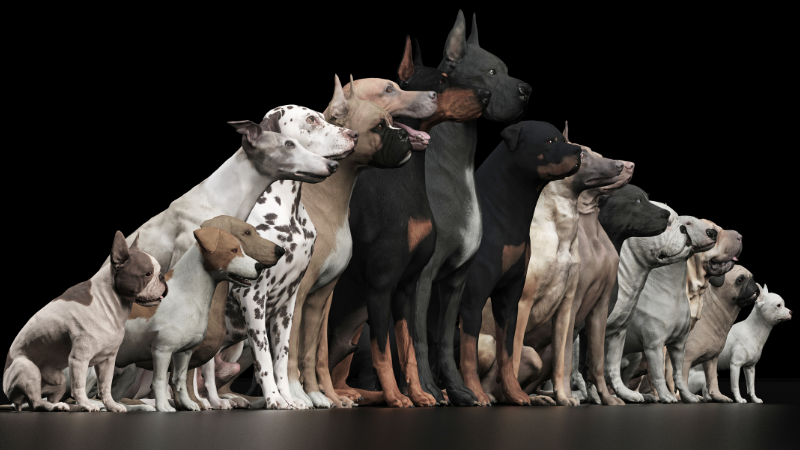When considering dog ownership, many different questions come to mind. One of the most important things to consider is what size dog you would like to adopt or purchase. While some may consider it to be as easy as picking the cutest dog or the largest, there are several factors to consider before just grabbing up any dog.
1. Can You Physically Care for the Size of Your Dog?
For less physically strong owners, who can’t lift heavy weights or control a larger dog while they are on a leash, a miniature, small, or medium dog is the way to go. You definitely don’t want to purchase a dog that will grow to be bigger or heavier than you’re able to physically handle. This can make it difficult to control your dog if they start to get aggressive on a leash and pull you or it they need help being carried into a high car, etc.
Say you’re a smaller person or someone who can’t lift heavy objects and your large dog gets sick or in an accident where they are severely hurt. There’ll be no way for you to carry the dog to your vehicle to bring them to the veterinarian’s office. You’ll have to find someone who can help, and that can waste precious time.
A responsible dog owner should always be in control of their dog. If a dog is big enough that it’s out of your control sometimes, then you probably would’ve been better off with a smaller dog.
Think about the dog breed at its most aggressive, worst case scenario. Would you be willing, confident, and able to pick up, tackle, or hold back the dog as it’s snarling and snapping? If the answer if no, whether it’s because you’d be physically unable to or mentally afraid to, then it’s time to look at smaller dogs.
2. Is Your Living Situation is Right for the Size of Your Dog?
Some apartments and rental have dog size requirements or bread restrictions. If you’re renting and plan to continue renting for many years, then it may not be a wise idea to purchase a larger dog at this time, even if your current rental allows bigger animals. Odds are, you’ll need to switch rentals at some point and the bigger dog may limit your options in an already tough market.
A miniature or standard dog may be all you’re allowed to have in your current living situation. Many landlords and HOAs do not allow tenants to own dogs over a certain size, for fear of property damage. Be sure to check into your rental or homeowner’s agreement before bringing home a dog that you will eventually have to take back.
3. Can you Handle Larger Expenses?
Large dogs usually have larger expensive. They have bigger vet bills, require more food each year, and bigger products like kennels and dog beds that all cost more.
The fiscally conscious dog owner should also shy away from adopting or purchasing a giant dog, for the simple fact that larger dogs eat more and require more disposable income in order to keep up with their food demands. In addition, collars, kennels, and beds, as well as various other supplies, tend to cost more when being purchased for larger dogs as opposed to smaller ones.
4. Space May Not Be As Much of an Issue.
One common misconception is that the bigger your dog is, the more space they will require. This is false, as the dog’s size has little to do with their space necessities.
In reality, the more energetic the dog is, the more space and exercise the dog will need. Many giant dogs are lethargic and don’t move around much, while plenty of miniature and standard dogs bounce off the walls all day long, filled with playful energy.
Bigger dogs will require a bit more space, as simple actions like tail wagging can cause damage in smaller spaces, but a bigger dog doesn’t automatically equal a huge house and yard.
5. Bigger Dogs Tend to Have Shorter Life Spans.
Unfortunately, the larger dogs tend to have shorter life spans. Great Danes may only live 6 years, Golden retrievers usually live around only 10-12 years, while it’s not very uncommon to hear of dogs like chihuahuas living close to 20 years.
Sure, 6 or ten years may seem like a long time when you’re first bringing home a new dog, but time will fly and the heartache of putting down your beloved pet isn’t fun no matter how long you’ve had with them. The life span of your pet may be a huge factor when selecting your new dog, especially if you know you don’t handle loss well.
6. Are Your Personalities and Lifestyles Compantible?
Choosing the right size dog has just as much to do with your personality and living situation as any other factor. If you’re a homebody who likes to curl up with a good book, a smaller dog low energy dog is the choice for you. For the adventurous types who like to take their dog out for hikes and other physical activities, a standard or giant dog is just what the doctor ordered. Smaller dogs may struggle to keep up on long hikes.
The climate where you live is important as well. If you live in a colder climate, while you may have your heart set on a small dog you can carry around, they struggle to keep themselves warm and will need more attention from you keep them safe from freezing to death. However, arctic breeds will love the colder climate and struggle in warmer areas that never see snow.
When choosing a new dog, be sure to consider all of these important factors and don’t pick a dog based on how cute of a puppy it is. Puppies become full grown dogs faster than you can blink and change even the best laid plans.
What kind of dog do you have? Share with us in the comments below!




